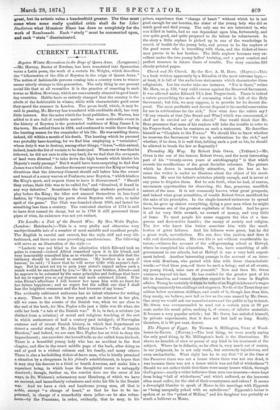Threading My Way. By Robert Dale Owen. (Trilbner.)—Mr. Owen is
the son of the famous Robert Owen, and the most interesting part of his "twenty-seven years of autobiography" is that which records his recollections of the great Socialist reformer. The picture which he draws is remarkably attractive, not the less so be- cause the writer is under no illusions about the object of his recol- lections. He sees his father's mistakes plainly enough, and is never at any pains to disguise them. But he sets forth, what he had, of course, uncommon opportunities for observing, the fine, generous, unselfish nature of the man. It is not commonly known what great prospects, and indeed what great actualities, of wealth Robert Owen sacrificed for the sake of his principles. In the single-hearted endeavour to spread these, he gave up almost everything, dying a poor man when he might have become one of the greatest capitalists of Scotland. And he gave it all for very little reward, no reward of money, and very little of fame. To most people his name suggests the idea of a dan- gerous and destructive fanatic ; the enemy of society and religion. The few who knew him better associate him with the. recol- lection of great failures. And his failures were great, bathe did a great work, nevertheless. His son does him justice, and 'does it with real discrimination. His own life is not without considerable in- terest,—witness the account of the sell-governing school at Hofwyl, where he completed his education. We, too, have something of self- government in our schools, but at Hofwyl it was a very bold experi- ment indeed. Another interesting passage is the account of an inter- view with Bentham, who parted with him with these characteristic
words :—"God. bless you,—if there be such a being ; and at all events, my young friend, take care of yourself." Now and then Mr. Owen
ventures beyond his last. He has resided for the greater part of his life in America, and cannot therefore expect to be at home in English affairs. Wrong he certainly is when he talks of an English labourer's wages as being commonly ten shillings and sixpence. North of the Trent they are seldom below seventeen shillings, and south of it, though less than this, they rarely, we believe, now fall so low as the sum named by Mr. Owen. One story we would ask our manufacturers and the public to lay to heart.
Mr. Owen was overpersuadod to send out a certain yarn at 20 per cent, under his usual price, making it, of course, of inferior materials.
It became a very popular article ; but Mr. Owen has satisfied himself, by private experiments, that it does not last half as long. Really, therefore, it is 60 per cent. dearer.


































 Previous page
Previous page